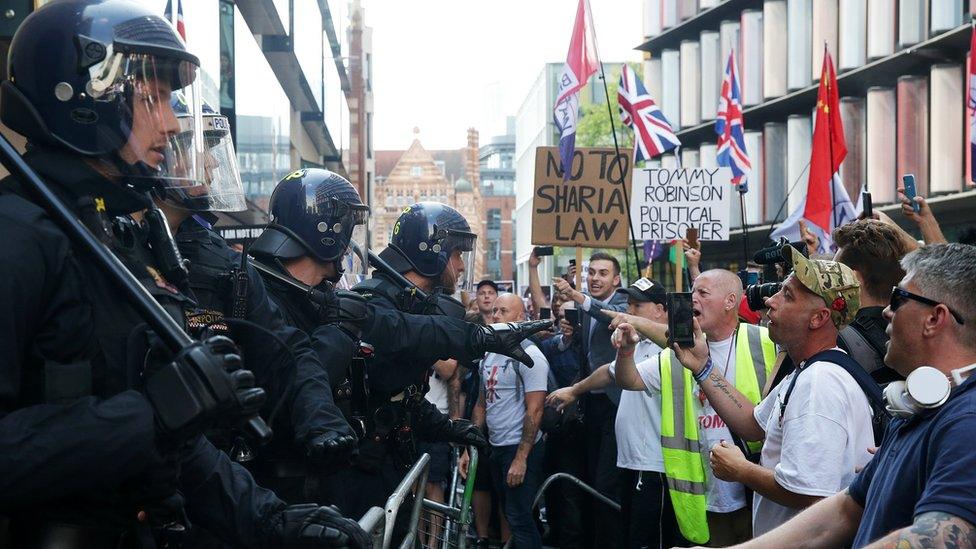Tommy Robinson jailed for contempt of court
- Published

Tommy Robinson has been jailed for nine months for contempt of court.
The ex-English Defence League leader was found guilty last week of interfering with the trial of a sexual grooming gang at Leeds Crown Court in May 2018.
Two Old Bailey judges said his Facebook Live video of defendants in the trial had encouraged "vigilante action".
A social media account in Robinson's name called his sentence an "absolute joke" and said it was time to protest.
Outside court, his supporters pelted police with bottles and cans.
Later, journalists filming on College Green outside the Houses of Parliament were verbally abused, physically intimidated and had their equipment attacked before police officers arrived.
The BBC News at One cut short a broadcast from College Green as protesters interrupted a live report.
Police said no arrests had yet been made in relation to Thursday's protests.
But officers did arrest three people for affray, and one for a public order offence in relation to a protest that happened outside court on the day of Robinson's conviction last Friday.
Four other people had already been arrested for affray on Friday.

Supporters of Tommy Robinson gathered outside Parliament
Outside the Old Bailey, supporters of Robinson, whose real name is Stephen Yaxley-Lennon, booed and chanted "we want Tommy out" after his sentencing, before some began throwing missiles at police.
As a prison van thought to contain Robinson drove away, several people shouted "we love you, Tommy".

Protesters also gathered in large numbers outside the Old Bailey
During the 2018 case at Leeds Crown Court, reporting restrictions had been put in place postponing the publication of any details until the end of a series of linked trials involving 29 defendants.
However, Robinson, 36, from Luton, broadcast footage from outside the court on 25 May 2018, while the jury in the second trial of the series was considering its verdict.
The video lasted an hour-and-a-half and was viewed online 250,000 times, after being live-streamed on Facebook.
In a written ruling, Dame Victoria Sharp said Robinson had claimed his intention in making the broadcast was to "denounce the media" for their behaviour.
But the judges found he had encouraged others "to harass a defendant by finding him, knocking on his door, following him, and watching him".
This created "a real risk that the course of justice would be seriously impeded", she said.
Possible appeal
Robinson was originally jailed for 13 months on the day of the Facebook broadcast, but was released two months into his sentence after winning an appeal.
The case was then referred back to Attorney General Geoffrey Cox, who announced, in March this year, that it was in the public interest to bring fresh proceedings.
The nine month jail sentence served on Thursday includes six months for the Leeds Crown Court offence last year and another three months for contempt of court, following a suspended sentence given at Canterbury Crown Court in May 2017.
At the Old Bailey on Thursday, Dame Victoria told Robinson that the time he previously spent behind bars for contempt would be taken into account, reducing his sentence to 19 weeks - of which he would serve half before being released.
Robinson's barrister Richard Furlong raised the possibility of an appeal against the court's decision and was told he has 28 days to apply.
The attorney general said the sentencing illustrated how seriously the courts would take matters of contempt.
"I would urge everyone to think carefully about whether their social media posts could amount to contempt of court," Mr Cox added.

What is contempt of court?
Contempt of court laws exist to ensure people have fair trials. The idea is that juries must not be influenced by anything but the evidence they hear in court.
The rules apply to everyone from journalists to people posting comments on social media, and even jurors.
If someone interferes with a trial, the defendants can walk free and a new trial may have to be held.
The maximum sentence for contempt of court is two years in prison, but it can also be punished with an unlimited fine.
Contempt includes publishing anything that creates a substantial risk of seriously prejudicing "active" criminal proceedings. Proceedings become "active" when a suspect is arrested.
Someone could also be in contempt by actions including taking photographs or film, recording what is said in court or talking to a jury member about a case.
- Published11 July 2019